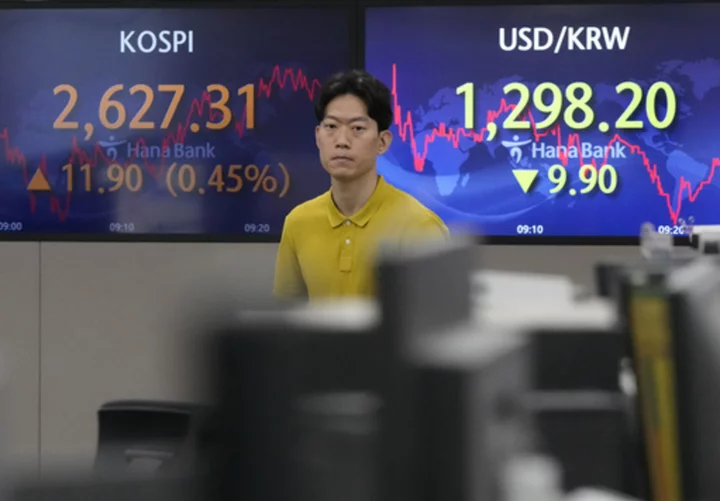BANGKOK (AP) — Asian shares were mixed Wednesday after a day of listless trading on Wall Street in the absence of market-moving data.
China reported its exports fell 7.5% from a year earlier in May and imports were down 4.5%, adding to signs of a slowing of its economic recovery following the lifting in December of anti-virus controls that disrupted travel and commerce.
The decline in exports was the first year-on-year drop in in three months, with export volumes falling below their levels at the start of the year. “And with the worst yet to come for many developed economies, we think exports will decline further before bottoming out later this year,” Julian Evans-Pritchard of Capital Economics said in a commentary.
The Shanghai Composite index lost 0.1% to 3,192.41 while the Hang Seng in Hong Kong gained 0.7% to 19,232.94.
Tokyo's Nikkei 225 index lost 1.8%, the sharpest decline in 12 weeks, to 31,913.74. Analysts said investors were selling to lock in recent gains.
In Seoul, the Kospi was nearly unchanged at 2,615.60, while Australia's S&P/ASX 200 edged 0.2% lower to 7,118.00. Shares rose in Taiwan but fell in Bangkok.
On Tuesday, the S&P 500 rose 0.2% to 4,283.85.That's just 0.2% away from finishing 20% above where it was in mid-October, as a long-predicted recession has yet to hit and excitement around artificial intelligence has helped a select group of stocks to soar.
The Dow Jones Industrial Average edged up by less than 0.1% to 33,573.28, while the Nasdaq composite rose 0.4%, to 13,276.42.
Gitlab soared 31.2% after the software development platform gave a revenue forecast for the fiscal year that topped analysts’ expectations.
Investors are watching to see which will happen first: a recession or inflation falling enough to get the Federal Reserve to start cutting interest rates, which have climbed so high they’ve hurt various parts of the economy.
Next week, the U.S. government will publish its latest monthly updates on inflation, and the Federal Reserve will meet on interest-rate policy. The bet on Wall Street is that the Fed may hold off on hiking rates, which would be the first time that’s happened in more than a year, but could resume raising rates in July.
Some of Tuesday's strongest action was in the cryptocurrency world after the Securities and Exchange Commission charged Coinbase with operating its trading platform as an unregistered national securities exchange, broker and clearing agency.
Shares of its parent, Coinbase Global, tumbled 12.1% after the SEC also accused it of being liable for some of Coinbase’s violations. Other charges focused on Coinbase’s staking-as-a-service program, where users get payments for their crypto almost like earning interest from a traditional bank savings account.
Coinbase criticized the SEC's approach to crypto, saying “the solution is legislation that allows fair rules for the road to be developed transparently and applied equally, not litigation.”
A day earlier, the SEC filed 13 charges against another huge crypto trading platform, Binance, and its founder. Binance said it had been in discussions to reach a negotiated settlement to resolve the SEC's investigations.
The frenzy around AI has helped a handful of stocks soar to immense gains this year, including a 164.5% surge in chipmaker Nvidia. That's helped drive much of the S&P 500's gains in 2023, but it's also caused critics to question whether a bubble is forming. They also say the furor around AI may be masking weakness beneath the S&P 500's surface.
Even though the S&P 500 is nearing a bull market, almost as many stocks within it are down this year as up as worries remain about falling corporate profits, still-high inflation and much higher interest rates than a year ago.
In other trading Wednesday, a U.S. crude oil fell 49 cents to $71.25 a barrel in electronic trading on the New York Mercantile Exchange. On Tuesday, it lost 41 cents to $71.74 a barrel. A barrel of Brent crude, the international standard, sank 51 cents to $75.78 a barrel.
Both were close to $120 a year ago but have fallen amid worries about a strapped global economy’s need for fuel.
The U.S. dollar bought 139.32 Japanese yen, down from 139.66 yen. The euro fell to $1.0677 from $1.0695.

